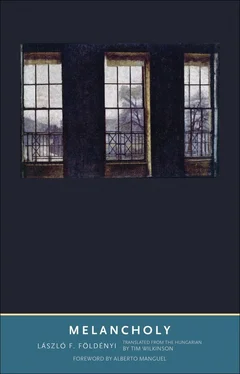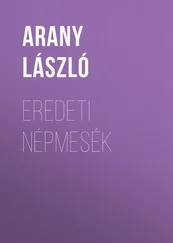Consistently adopted uniqueness and self-reliance make the melancholic an isolated eccentric (  ) — an idiot. Yet even if he suffers from his situation, he experiences it quite differently from the way that external observers see it. The psychosensory disturbances experienced by the melancholic indicate the difference: he feels his head to be empty and his body to be an alien entity, his perspective and experience of time become disturbed, etc. — all that seems groundless (“unjustified”) to an outside observer, yet it still helps the melancholic constructs his own world so that no one else can enter it. The illusions, visions, and psychosensory disturbances coupled with a perfectly intact consciousness are not just of “bodily” or “psychological” origin — they are harbingers of a singular experience of being (and that being does not necessarily have to be linked with pathological sensations and perceptions). The melancholic is perfectly free yet totally bound while creating a world where different laws apply from those in the “other,” accustomed world. The new world of the melancholic is born of the insight that he has made a mess of what he deemed to be his own possibilities, thereby becoming a victim of a serious injustice: the possible became impossible, and what had looked impossible (that is, that he would become a prisoner of himself) came true. The notion of possibility acquires a new meaning here: as it fuses with the concept of impossibility, it takes on a meaning different from the colloquial sense. For the melancholic, possibilities smuggle infinity into existence, and that, rather than the chance of their turning into reality, is their main value . The melancholic knows what an opportunity is but cannot avail himself of it, because he missed it long ago; in his case, opportunity therefore means experiencing infinity within total, finite constraint — yearning without an object, futile hope. “My whole life is one great homesickness,” Gustav Mahler wrote in a letter. And Kierkegaard noted the following: “What is sickness? Melancholy. Where is the seat of this sickness? In the power of imagination: and it feeds on possibility” ( Stages on Life’s Way , 356) Future-directedness, which elevates man above all living creatures, is for the melancholic a source of torment; the future is an unfolding of coming possibilities, but since from the outset he has let everything slip, there is nothing to unfold. For the melancholic, the future does not signify the realization of opportunities but the possibility of real things passing: the future relates to transience, that is, it is not a future but a coming past expressible in no verbal tense. 14“I was already elderly when I was born,” begins an entry in the journal of Kierkegaard, who considered it to be the truest mark of despair that all the past is preserved in it. “I skipped childhood and adolescence.” The melancholic experiences opportunities and hope more deeply than anyone, since for him there is nothing to come true, nothing to hope for. Luther, who was not free from melancholia, wrote: “Hope directs the gaze to expected things, but that does not become visible. So the glance is directed at the unknown, the hidden, the inner darkness, in such a manner that it does not know what it hopes for, but knows what it does not hope for” (quoted in Rudolf Bultmann, “Humanismus und Christentum,” 73). For the melancholic, the story of Pandora’s box possesses the most profound truth: all manner of suffering was unleashed on the human race; only hope, Elpis, remained in the jar. At the bottom of the loss of hope one can discern a closure in the face of hope; hence the bad conscience of the melancholic (he sees his life as a series of omissions) but also his clear-sightedness. After all, everyone has hope except the person who is omniscient: “For we are saved by hope; but hope that is seen is not hope: for what a man seeth, why doth he yet hope for?” (Romans 8:24). Only the omniscient is exempt from hoping; those who have no hope regard hopelessness, closure, and being deprived of all possibility as a normal state — and what else would that be but death?
) — an idiot. Yet even if he suffers from his situation, he experiences it quite differently from the way that external observers see it. The psychosensory disturbances experienced by the melancholic indicate the difference: he feels his head to be empty and his body to be an alien entity, his perspective and experience of time become disturbed, etc. — all that seems groundless (“unjustified”) to an outside observer, yet it still helps the melancholic constructs his own world so that no one else can enter it. The illusions, visions, and psychosensory disturbances coupled with a perfectly intact consciousness are not just of “bodily” or “psychological” origin — they are harbingers of a singular experience of being (and that being does not necessarily have to be linked with pathological sensations and perceptions). The melancholic is perfectly free yet totally bound while creating a world where different laws apply from those in the “other,” accustomed world. The new world of the melancholic is born of the insight that he has made a mess of what he deemed to be his own possibilities, thereby becoming a victim of a serious injustice: the possible became impossible, and what had looked impossible (that is, that he would become a prisoner of himself) came true. The notion of possibility acquires a new meaning here: as it fuses with the concept of impossibility, it takes on a meaning different from the colloquial sense. For the melancholic, possibilities smuggle infinity into existence, and that, rather than the chance of their turning into reality, is their main value . The melancholic knows what an opportunity is but cannot avail himself of it, because he missed it long ago; in his case, opportunity therefore means experiencing infinity within total, finite constraint — yearning without an object, futile hope. “My whole life is one great homesickness,” Gustav Mahler wrote in a letter. And Kierkegaard noted the following: “What is sickness? Melancholy. Where is the seat of this sickness? In the power of imagination: and it feeds on possibility” ( Stages on Life’s Way , 356) Future-directedness, which elevates man above all living creatures, is for the melancholic a source of torment; the future is an unfolding of coming possibilities, but since from the outset he has let everything slip, there is nothing to unfold. For the melancholic, the future does not signify the realization of opportunities but the possibility of real things passing: the future relates to transience, that is, it is not a future but a coming past expressible in no verbal tense. 14“I was already elderly when I was born,” begins an entry in the journal of Kierkegaard, who considered it to be the truest mark of despair that all the past is preserved in it. “I skipped childhood and adolescence.” The melancholic experiences opportunities and hope more deeply than anyone, since for him there is nothing to come true, nothing to hope for. Luther, who was not free from melancholia, wrote: “Hope directs the gaze to expected things, but that does not become visible. So the glance is directed at the unknown, the hidden, the inner darkness, in such a manner that it does not know what it hopes for, but knows what it does not hope for” (quoted in Rudolf Bultmann, “Humanismus und Christentum,” 73). For the melancholic, the story of Pandora’s box possesses the most profound truth: all manner of suffering was unleashed on the human race; only hope, Elpis, remained in the jar. At the bottom of the loss of hope one can discern a closure in the face of hope; hence the bad conscience of the melancholic (he sees his life as a series of omissions) but also his clear-sightedness. After all, everyone has hope except the person who is omniscient: “For we are saved by hope; but hope that is seen is not hope: for what a man seeth, why doth he yet hope for?” (Romans 8:24). Only the omniscient is exempt from hoping; those who have no hope regard hopelessness, closure, and being deprived of all possibility as a normal state — and what else would that be but death?
The present is “open” solely toward evanescence; the future becomes past, whereas the past is synonymous with the present moment. For the melancholic, the extension of the present moment and its exclusivity are a result of glimpsing the essence of time: for him, time is not an “objective” entity to be measured with a clock, but a function of human situations; it is not external in relation to man, but a consequence of human activity and perspective. Time and the human condition are just as indistinguishable as body and soul: their relation is characterized as one of interdependence. (Aristotle, in anticipation of the interpretations of space and time by the most recent theories of physics, postulated that time is inseparable from the calculator (that is, the mind): “If nothing can count except consciousness. . it is impossible that time should exist if consciousness does not” ( Physics , 223a). That is why the melancholic experiences time differently from nonmelancholics: the transformation of time follows from his singular situation (loss of hope and purposeless yearning). If illness, suffering, and death are not blows arriving from outside but possibilities unfolding from within, then the duration of life also depends on the person (within the biological threshold), an extreme manifestation of this being the “speeding up” or “slowing down” of time (in the case of man, the “moment” of death is determined mentally as well: one can be ready to die but can also keep death waiting). The Middle Ages, which considered humans to be metaphysically determined in all respects, regarded time as a gift of God independent of them, and its “objectivity” was external in relation to the attitude of the observer. 15It was no accident that time was a problem precisely for those who wanted to find their path to God alone, solitarily, without external help — or even to battle with him. If what we make of ourselves depends on ourselves, then the sense of time also depends on ourselves: this assumption perturbed mystics (who experienced the decline of the Middle Ages more keenly than anyone) just as much as it did melancholics, against whom one of the accusations brought up in the Middle Ages was precisely that they were constantly brooding about the past and casting glances at an unknown future instead of at eternity. The Middle Ages judged time on the basis of divine eternity, whereas mystics and melancholics contrasted time with eternity: the differentiation of endless time and timeless, living eternity follows from the human capacity to create time. Since the human intellect is infinite, and cannot reach its goal in time, it stands outside time, Marsilio Ficino stated. According to Pico della Mirandola, if we are raised to the most sublime heights of theology, “we shall be able to measure with the rod of indivisible eternity all things that are and that have been” ( Oration on the Dignity of Man , 27). The ability to step outside time (a secret of melancholic Renaissance portraits!) means that human beings have mastered time: they bestow unique, irreplaceable meaning on their own existence, and thereby they also bestow upon themselves their own time, a rhythm of being typical only of themselves. The timelessness experienced by the mystic automatically presupposes that time is a function of the human situation: in the case of the melancholic, the melting (or rather, freezing) of the future and the past into the present moment is a consequence of the conversion of the lived present into a lived timelessness. Because of its slow circling around the sun, Saturn, the planet of melancholics, embodies eternal time in certain Eastern notions, and “eternal time” is indeed the name given to the planet in Armenian texts (Zurvān = Zoroaster). Lived timelessness, although it may afford a glimpse of a new philosophy, results in a form of deprivation: the melancholic does not know the future as possibility; therefore, timelessness is not complete attainment for him but rather the opposite: a complete lack of attainment, a complete deficiency. The self-reproach typical of the melancholic corresponds to a religious sense of guilt: he feels that he has missed his appointed time, his kairos —which in the New Testament is the instant when man comes close to eternity — and has fallen hopelessly behind his own possibilities. The eternity experienced by the melancholic is a negative eternity: he is damned to eternal unfulfillment, to a constant experience of lack. A melancholic patient announced to his physician day after day that he would be executed that evening, and he was not convinced by the argument that he had already said that many times before. He had a sense of time that was different from that of nonmelancholics because the future could bring nothing new (for example, that he would not be executed after all). The melancholic’s revaluation of the future, the loss (or rather, purposelessness) of hope, creates a tension characteristic of his makeup: he who has no hope sees everything clearly — but to have a simultaneous view of all events is granted exclusively to God, who is located outside the creaturely, temporal world. The melancholic, who lives within the creaturely, temporal world, is compelled to live in and through time, which is incompatible with the transtemporality of the divine clarity of vision: he yearns in vain to withdraw from the world (Bellerophon). Another melancholic patient hid his watch so as not to be obliged to “see” the passage of time. As he recounted his condition to his psychiatrist:
Читать дальше

 ) — an idiot. Yet even if he suffers from his situation, he experiences it quite differently from the way that external observers see it. The psychosensory disturbances experienced by the melancholic indicate the difference: he feels his head to be empty and his body to be an alien entity, his perspective and experience of time become disturbed, etc. — all that seems groundless (“unjustified”) to an outside observer, yet it still helps the melancholic constructs his own world so that no one else can enter it. The illusions, visions, and psychosensory disturbances coupled with a perfectly intact consciousness are not just of “bodily” or “psychological” origin — they are harbingers of a singular experience of being (and that being does not necessarily have to be linked with pathological sensations and perceptions). The melancholic is perfectly free yet totally bound while creating a world where different laws apply from those in the “other,” accustomed world. The new world of the melancholic is born of the insight that he has made a mess of what he deemed to be his own possibilities, thereby becoming a victim of a serious injustice: the possible became impossible, and what had looked impossible (that is, that he would become a prisoner of himself) came true. The notion of possibility acquires a new meaning here: as it fuses with the concept of impossibility, it takes on a meaning different from the colloquial sense. For the melancholic, possibilities smuggle infinity into existence, and that, rather than the chance of their turning into reality, is their main value . The melancholic knows what an opportunity is but cannot avail himself of it, because he missed it long ago; in his case, opportunity therefore means experiencing infinity within total, finite constraint — yearning without an object, futile hope. “My whole life is one great homesickness,” Gustav Mahler wrote in a letter. And Kierkegaard noted the following: “What is sickness? Melancholy. Where is the seat of this sickness? In the power of imagination: and it feeds on possibility” ( Stages on Life’s Way , 356) Future-directedness, which elevates man above all living creatures, is for the melancholic a source of torment; the future is an unfolding of coming possibilities, but since from the outset he has let everything slip, there is nothing to unfold. For the melancholic, the future does not signify the realization of opportunities but the possibility of real things passing: the future relates to transience, that is, it is not a future but a coming past expressible in no verbal tense. 14“I was already elderly when I was born,” begins an entry in the journal of Kierkegaard, who considered it to be the truest mark of despair that all the past is preserved in it. “I skipped childhood and adolescence.” The melancholic experiences opportunities and hope more deeply than anyone, since for him there is nothing to come true, nothing to hope for. Luther, who was not free from melancholia, wrote: “Hope directs the gaze to expected things, but that does not become visible. So the glance is directed at the unknown, the hidden, the inner darkness, in such a manner that it does not know what it hopes for, but knows what it does not hope for” (quoted in Rudolf Bultmann, “Humanismus und Christentum,” 73). For the melancholic, the story of Pandora’s box possesses the most profound truth: all manner of suffering was unleashed on the human race; only hope, Elpis, remained in the jar. At the bottom of the loss of hope one can discern a closure in the face of hope; hence the bad conscience of the melancholic (he sees his life as a series of omissions) but also his clear-sightedness. After all, everyone has hope except the person who is omniscient: “For we are saved by hope; but hope that is seen is not hope: for what a man seeth, why doth he yet hope for?” (Romans 8:24). Only the omniscient is exempt from hoping; those who have no hope regard hopelessness, closure, and being deprived of all possibility as a normal state — and what else would that be but death?
) — an idiot. Yet even if he suffers from his situation, he experiences it quite differently from the way that external observers see it. The psychosensory disturbances experienced by the melancholic indicate the difference: he feels his head to be empty and his body to be an alien entity, his perspective and experience of time become disturbed, etc. — all that seems groundless (“unjustified”) to an outside observer, yet it still helps the melancholic constructs his own world so that no one else can enter it. The illusions, visions, and psychosensory disturbances coupled with a perfectly intact consciousness are not just of “bodily” or “psychological” origin — they are harbingers of a singular experience of being (and that being does not necessarily have to be linked with pathological sensations and perceptions). The melancholic is perfectly free yet totally bound while creating a world where different laws apply from those in the “other,” accustomed world. The new world of the melancholic is born of the insight that he has made a mess of what he deemed to be his own possibilities, thereby becoming a victim of a serious injustice: the possible became impossible, and what had looked impossible (that is, that he would become a prisoner of himself) came true. The notion of possibility acquires a new meaning here: as it fuses with the concept of impossibility, it takes on a meaning different from the colloquial sense. For the melancholic, possibilities smuggle infinity into existence, and that, rather than the chance of their turning into reality, is their main value . The melancholic knows what an opportunity is but cannot avail himself of it, because he missed it long ago; in his case, opportunity therefore means experiencing infinity within total, finite constraint — yearning without an object, futile hope. “My whole life is one great homesickness,” Gustav Mahler wrote in a letter. And Kierkegaard noted the following: “What is sickness? Melancholy. Where is the seat of this sickness? In the power of imagination: and it feeds on possibility” ( Stages on Life’s Way , 356) Future-directedness, which elevates man above all living creatures, is for the melancholic a source of torment; the future is an unfolding of coming possibilities, but since from the outset he has let everything slip, there is nothing to unfold. For the melancholic, the future does not signify the realization of opportunities but the possibility of real things passing: the future relates to transience, that is, it is not a future but a coming past expressible in no verbal tense. 14“I was already elderly when I was born,” begins an entry in the journal of Kierkegaard, who considered it to be the truest mark of despair that all the past is preserved in it. “I skipped childhood and adolescence.” The melancholic experiences opportunities and hope more deeply than anyone, since for him there is nothing to come true, nothing to hope for. Luther, who was not free from melancholia, wrote: “Hope directs the gaze to expected things, but that does not become visible. So the glance is directed at the unknown, the hidden, the inner darkness, in such a manner that it does not know what it hopes for, but knows what it does not hope for” (quoted in Rudolf Bultmann, “Humanismus und Christentum,” 73). For the melancholic, the story of Pandora’s box possesses the most profound truth: all manner of suffering was unleashed on the human race; only hope, Elpis, remained in the jar. At the bottom of the loss of hope one can discern a closure in the face of hope; hence the bad conscience of the melancholic (he sees his life as a series of omissions) but also his clear-sightedness. After all, everyone has hope except the person who is omniscient: “For we are saved by hope; but hope that is seen is not hope: for what a man seeth, why doth he yet hope for?” (Romans 8:24). Only the omniscient is exempt from hoping; those who have no hope regard hopelessness, closure, and being deprived of all possibility as a normal state — and what else would that be but death?










